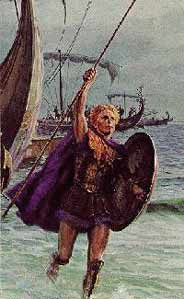
Alexander Ruled Macedonia: 336bc-323bc
Next, Alexander, uniting the Greeks, marched east toward Greec's ancient enemy, Persia. His allies numbered only thirty-five thousand men, and we was certain to meet forces at least twice that size. But alexander possessed gifts denied most men. He was brilliant in manuevering his infantry to strike enemy ranks at their weakest point. While leading cavalry charges, his bravery became a legend.
City After after city fell before Alexander's onslaught. At Susa, he captured a king's treasure of gold and silver so vast one historian claimed it took twenty thousand mules and five thousand camels to remove it. Upon arriving in gordium, Alexander was taken to see a famous rope tied in a mystical knot. Legends claimed that anyone who possessed the intelligence to unite the knot would rule all of Asia. Alexander looked at the knot, drew his sword, and cut the rope in have with one stroke.
When alexander marched on Egypt he was welcomed as a god. He founded the city of Alexandria, which flourished as a center of culture and trade. He took the long, toturous journey to the temple and the oracle of Zeus-Ammon. There, the priests proclaimed him a son of the gods, destined to command the world.
After conquering the entire Persian Empire, Alexander led his forces toward the Indus River, which, to the ancients was the world's end. He fought an Indian army whos soilders rode fearsome war elephants. The thundering bests panicked Alexander's horses, but he won the battle by attacking from an unexpected quarter.
Although he knew only victory on the battlefield, Alexander was unable to defeat the inner demons that plagued him. In a drunken fury he killed his best friend Clitus. When his beloved horse Bucephalus was killed in battle, Alexander sank into a deep depression that lasted months. At the height of his powers he often sat alone brooding. Some historians suggest he cried because he knew of no more worlds to conquer.
Alexander the Great married his first wife, oxane, the bactrian princess in 327 B.C. He also had a second and third wife. Alexander had an affair with Barsine and had an illegitamate son called Hercules. His first wife Roxane gave birth to a son after Alexanders death and named him "Alexander the IV"
In 323 B.C., Alexander the Great died of fever at age thirty-three. He had no heirs and the empire he carved out soon collapsed. But he will always be remembered as history's foremost military genius. More important, he brought Hellenic culture to the ends of the known world, and he encouraged a blending of polotics, literature , religion, philosophy, and the arts. Historians call the rich mixture that emerged after Alexander's time the Hellenistic Civilization. As the Greek historian Plutarch said of Alexander, "He believed that he had a mission from God to bring men into harmony with eachother and to reconcile the world."